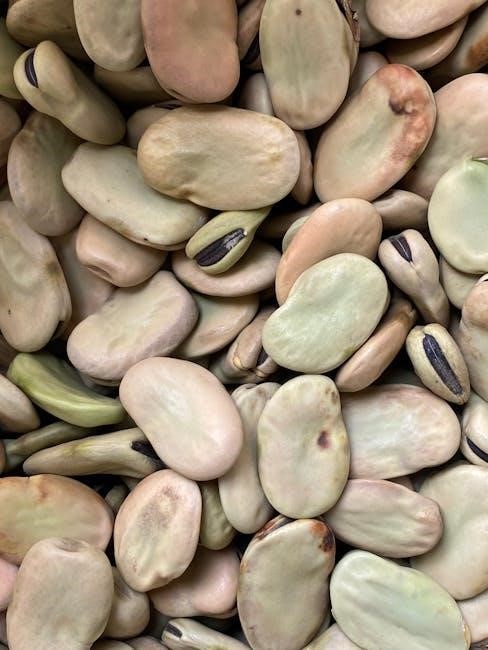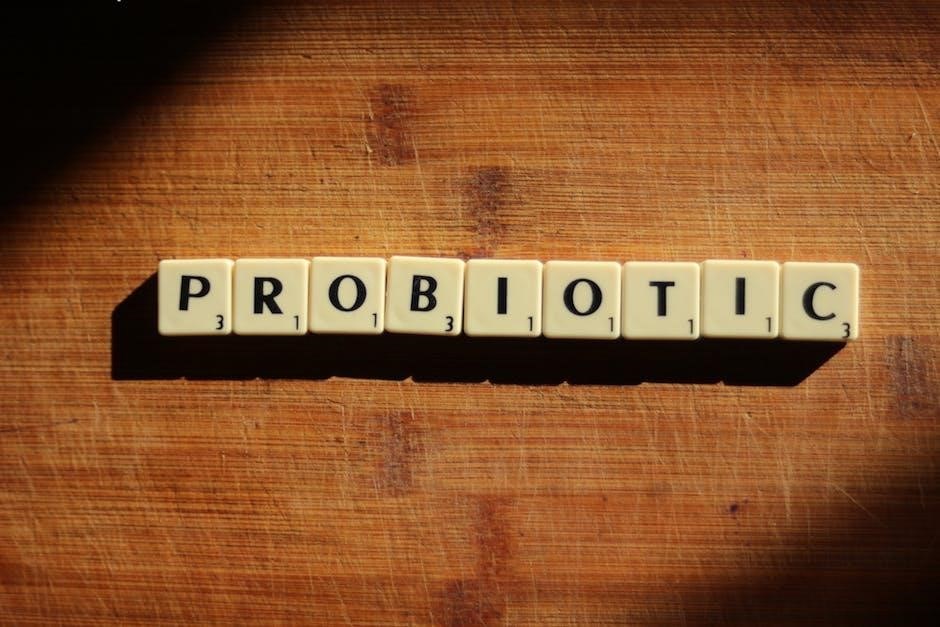The microbiome diet is a revolutionary approach focusing on gut health and its impact on metabolism and weight loss․ It emphasizes restoring gut balance to achieve lasting results․
By targeting specific foods, this diet aims to optimize gut microbiota, improving digestion, immunity, and overall wellness, offering a sustainable path to better health and vitality․
What is the Microbiome Diet?
The microbiome diet is a scientifically backed eating plan designed to restore gut health by balancing gut microbiota․ It focuses on consuming foods that nurture beneficial bacteria while avoiding those that disrupt microbial harmony․ The diet emphasizes whole, nutrient-dense foods, such as fruits, vegetables, lean proteins, and healthy fats, while minimizing processed foods, sugars, and artificial additives․ By optimizing gut health, the diet aims to enhance metabolism, support weight loss, and improve overall wellness․ It is based on the concept that a balanced gut microbiome is central to achieving and maintaining a healthy body and mind․
Unlike traditional diets, the microbiome diet prioritizes gut-friendly foods and avoids inflammatory triggers, making it a holistic approach to health and longevity․ It is grounded in research and offers a sustainable way to improve digestion, immunity, and energy levels․
Key Principles of the Microbiome Diet

The microbiome diet revolves around optimizing gut health by focusing on whole, nutrient-dense foods that promote beneficial bacteria․ It emphasizes fruits, vegetables, lean proteins from grass-fed or wild sources, and healthy fats like avocados and olive oil․ Fermented foods, such as yogurt and sauerkraut, are encouraged to support gut diversity․ The diet also stresses the importance of staying hydrated and avoiding processed foods, added sugars, and artificial additives․ Additionally, it advocates for mindful eating and listening to your body’s nutritional needs․ By adhering to these principles, individuals can create a balanced gut microbiome, which is foundational for overall health and vitality․

The Science Behind the Microbiome Diet
The microbiome diet leverages gut microbiota diversity to enhance metabolism and weight loss, supported by research linking gut health to overall wellness and immune function․
How the Gut Microbiome Affects Weight Loss
The gut microbiome plays a crucial role in weight loss by influencing metabolism, energy extraction, and fat storage․ Specific bacteria in the gut enhance metabolic function, aiding in calorie burn and fat breakdown․ A diverse microbiome improves gut health, boosting metabolic rates and appetite regulation․
Research shows that an imbalanced microbiome can slow metabolism, leading to weight gain․ By fostering a balanced gut ecosystem, the microbiome diet promotes efficient energy use, making weight loss more achievable and sustainable over time․
The Role of Gut Health in Overall Wellness
Gut health is central to overall wellness, influencing digestion, nutrient absorption, and immune function․ A balanced gut microbiome supports the body’s ability to fight infections and maintain optimal bodily functions․
Research highlights the gut-brain axis, linking gut health to mental well-being․ A healthy gut reduces inflammation, enhances energy levels, and supports skin health, contributing to a higher quality of life and reducing the risk of chronic diseases․
Benefits of the Microbiome Diet
The microbiome diet improves gut health, boosting metabolism, immune function, and energy levels while reducing inflammation and promoting sustainable weight loss and overall well-being naturally․
Improving Gut Health
The microbiome diet focuses on enhancing gut health by promoting a balanced gut microbiota․ It encourages the consumption of prebiotic-rich foods, polyphenols, and fermented items, which nourish beneficial bacteria․ This balance reduces inflammation, improves digestion, and strengthens the gut barrier․ A healthy gut microbiome enhances nutrient absorption and immune function, leading to overall wellness․ By avoiding processed foods and antibiotics, the diet protects microbial diversity․ Scientific research, including Dr․ Chutkan’s work, supports the gut-immune connection, showing how dietary changes can restore gut health and improve metabolism․ This approach not only aids digestion but also addresses systemic health issues, making it a holistic solution for long-term well-being․
Supporting Weight Loss and Metabolism
The microbiome diet plays a crucial role in weight loss and metabolic health by optimizing gut microbiota․ A balanced gut enhances fat metabolism, reduces inflammation, and improves insulin sensitivity․ Certain foods promote the growth of bacteria that regulate appetite and energy storage․ By avoiding processed foods and artificial additives, the diet prevents microbial imbalances that hinder metabolism․ Research highlights how a diverse gut microbiome boosts calorie burning and prevents weight regain․ This approach not only aids in shedding pounds but also maintains a healthy metabolic rate, making it a sustainable solution for long-term weight management and overall vitality․
Implementing the Microbiome Diet
The microbiome diet is a lifestyle change focusing on gut-friendly foods, avoiding processed items, and fostering a balanced microbiome for sustainable health and weight management․
Step-by-Step Guide to Getting Started
Starting the microbiome diet involves a few simple yet impactful steps to reset your gut health and metabolism․ First, eliminate processed foods, sugars, and unhealthy fats to reduce inflammation․ Next, incorporate gut-friendly foods like fermented vegetables, leafy greens, and whole grains to nourish your microbiome․ Stay hydrated with plenty of water and consider adding probiotic-rich beverages․ Manage stress through mindfulness or exercise to support gut balance․ Finally, monitor your progress by tracking digestion, energy levels, and weight changes․ These steps create a foundation for achieving long-term wellness and sustainable weight loss through a healthier gut microbiome․
Foods to Include and Avoid
Focusing on gut-friendly foods is central to the microbiome diet․ Include fermented foods like yogurt, kefir, sauerkraut, and kimchi, which are rich in probiotics to support gut health․ Leafy greens, whole grains, and fruits high in fiber, such as berries and apples, act as prebiotics, nourishing beneficial bacteria․ Healthy fats like avocado, olive oil, and nuts are also essential․ Avoid processed foods, added sugars, and unhealthy fats, as they disrupt gut balance and promote inflammation․ Limit alcohol and refined carbohydrates, which can harm gut microbiota․ By choosing nutrient-dense, whole foods, you create an environment for your microbiome to thrive, supporting weight loss and overall wellness․

Success Stories and Case Studies
Individuals report improved digestion, weight loss, and enhanced immunity after adopting the microbiome diet․ Scientific studies highlight its effectiveness in transforming gut health and overall well-being․
Real-Life Experiences with the Microbiome Diet
Many individuals have shared their transformative journeys with the microbiome diet․ One user reported significant weight loss and improved digestion after just three weeks․ Another individual highlighted enhanced energy levels and reduced bloating․ These real-life experiences underscore the diet’s potential to address various health challenges․ By focusing on gut-friendly foods, participants often achieve sustainable results, leading to long-term wellness․ The diet’s emphasis on personalized nutrition has made it accessible and effective for diverse populations, fostering a community of supporters who advocate for its benefits․ These stories provide powerful evidence of the microbiome diet’s impact on overall health and well-being․
Scientific Research Supporting the Diet
Research highlights the microbiome diet’s effectiveness in promoting gut health and weight loss․ Studies show that gut microbiota plays a crucial role in metabolism and fat absorption․ Diets rich in fiber, polyphenols, and omega-3 fatty acids foster a balanced microbial environment; Clinical trials demonstrate improved metabolic function and reduced inflammation in participants․ The diet’s focus on prebiotics and probiotics aligns with scientific recommendations for gut health․ These findings support the microbiome diet as a evidence-based approach for sustainable weight management and overall wellness, backed by robust scientific research and positive health outcomes․

Common Mistakes to Avoid
Over-reliance on supplements and neglecting whole foods can hinder progress․ Restrictive eating and lack of patience are common pitfalls that disrupt gut balance and long-term success․
Pitfalls When Following the Microbiome Diet
One common mistake is relying too heavily on supplements without focusing on whole foods, which can disrupt gut balance․ Another pitfall is restrictive eating, which may lead to nutrient deficiencies and frustration․ Impatience is also a major issue, as gut health restoration is a gradual process․ Additionally, ignoring individual nutritional needs can hinder progress, as the microbiome varies from person to person․ It’s crucial to avoid these mistakes to ensure the diet’s effectiveness and maintain long-term benefits for overall health and weight management․
Troubleshooting Common Issues
Common issues on the microbiome diet include digestive discomfort, such as bloating or constipation, which can occur during the gut restoration phase․ To address this, gradually introduce new foods and consider probiotics․ Another issue is cravings, which can be managed by incorporating nutrient-dense alternatives․ Some individuals may experience plateaus in weight loss, which can be overcome by adjusting portion sizes or activity levels․ Additionally, ensuring adequate hydration and fiber intake is crucial to support gut health․ Consulting a healthcare provider or dietitian can also help tailor the diet to individual needs, maximizing its effectiveness and minimizing challenges․
The microbiome diet offers a sustainable path to weight loss and improved gut health․ Continuing education and expert guidance can enhance long-term success and overall wellness․
Long-Term Maintenance of Gut Health
Maintaining gut health long-term requires a balanced diet rich in fiber, polyphenols, and fermented foods to support gut microbiota diversity․ Staying hydrated and avoiding processed sugars is crucial․
Regular physical activity and stress management also play roles in sustaining a healthy microbiome․ Monitoring gut health through symptoms and periodic testing can help identify imbalances early․
Consulting a healthcare provider for personalized nutrition plans ensures long-term success․ Consistency in these practices promotes a balanced microbiome, leading to improved digestion, immunity, and overall well-being․
Resources for Further Learning
For deeper insights, explore scientific studies on gut microbiota and weight loss, such as those found in “The Microbiome Diet” PDF․ Dr․ Chutkan’s research offers practical immune health strategies․
Visit online platforms like ResearchGate for microbiome-related research and consider reaching out to experts in the field for tailored advice․ Additionally, books by specialists provide comprehensive guides for implementation․
Engaging with communities focused on gut health and nutrition can also offer support and shared experiences, enriching your understanding and application of the diet․